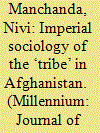|
|
|
Sort Order |
|
|
|
Items / Page
|
|
|
|
|
|
|
| Srl | Item |
| 1 |
ID:
183870


|
|
|
|
|
| Summary/Abstract |
This article wrestles with the question of ‘national’ borders in racial capitalism. We do so through an examination of border and capitalist corridors. We focus particularly on the Israeli border, branded and then sold to the rest of the world by the epistemic community of border-makers and interlocutors. In tracking the Israeli border and showing the implication of the experts and their markets, we ask how the border reflects and is refracted through a global order organized by the twin dictates of racism and capitalism. We are especially interested in how racialized processes of bordering, ostensibly governed by national exigencies, are transplanted on to other contexts. Two points emerge from this: in the first instance, we ask who and what enables this movement of the border. And in the second, we interrogate which logics and practices are transplanted with the border, as it is reproduced and seemingly fixed in a new place. We examine the violent ontologies that give shape and reputation to Israel's high-tech border industry, which has become a model for the ever-growing global homeland security industry. We ask: has Israel's border become an exportable commodity and who are the actors who have enabled this ‘achievement’? Related to this, what sort of occlusions and structural violence does the fetishization of the Israeli border rely on?
|
|
|
|
|
|
|
|
|
|
|
|
|
|
|
|
| 2 |
ID:
167660


|
|
|
|
|
| Summary/Abstract |
Afghanistan appears to exist in a different time from ‘us.’ Modernization theory, linear narratives of progress, teleological tales of growth and common sense stories of development seem to have met their match when it comes to this landlocked country. This paper considers the ubiquitous construction of Afghanistan as the ‘Graveyard of Empires’ to explore the ways in which representation, memory-making, and an allegory of mythic import perform a constitutive function and help suture an otherwise disjointed history of Afghanistan. Conducting a sustained inquiry into the political valence of the Graveyard trope, the paper reveals that it is especially ill-chosen on three counts. (i) It is ahistorical, relying on a selective evocation of history. Related to this ahistoricism, it sets up the past as the ‘key’ to understanding the Afghan present. On this account, another future is not possible. (ii) It is geographically or at least ‘physically’ deterministic: Afghanistan is constructed as a land of unconquerable terrain, its topography menacing and ultimately unassailable. Not only does this present the physical environment as an immutable entity, it also feeds into representations of Afghans as rugged warriors, bred to be weathered and connately austere. (iii) It is racialized: Afghans as inhabitants, creators and living relics of this graveyard are constructed as inured to hardship, belligerent and always already girded for combat. Thus the ‘graveyard of empires’ becomes a politically charged trope that is engaged in a continual re-inscription of the Afghan population as an alien other.
|
|
|
|
|
|
|
|
|
|
|
|
|
|
|
|
| 3 |
ID:
157593


|
|
|
|
|
| Summary/Abstract |
The ‘tribe’ is a notion intimately related to the study of Afghanistan, used as a generic signifier for all things Afghan, it is through this notion that the co-constitution of coloniser and colonised is crystallised and foregrounded in Afghanistan. By tracing the way in which the term ‘tribe’ has been deployed in the Afghan context, the article performs two kinds of intellectual labour. First, by following the evolution of a concept from its use in the early 19th century to the literature on Afghanistan in the 21st century, wherein the ‘tribes’ seem to have acquired a newfound importance, it undertakes a genealogy or intellectual history of the term. The Afghan ‘tribes’ as an object of study, follow an interesting trajectory: initially likened to Scottish clans, they were soon seen as brave and loyal men but fundamentally different from their British interlocutors, to a ‘problem’ that needed to be managed and finally, as indispensable to a long-term ‘Afghan strategy’. And second, it endeavours to describe how that intellectual history is intimately connected to the exigencies of imperialism and the colonial politics of knowledge production.
|
|
|
|
|
|
|
|
|
|
|
|
|
|
|
|
| 4 |
ID:
137075


|
|
|
|
|
| Summary/Abstract |
A certain, pathologised image of the Afghan man now dominates the mainstream Western imaginary. This article interrogates representations of Pashtun males in Anglophone media, arguing that these representations are embedded in an Orientalist, homo-nationalist framework. Through a specific focus on the construction of the Taliban as sexually deviant, (improperly) homosexual men, the paper underscores the tensions and contradictions inherent in the hegemonic narrative of ‘Pashtun sexuality’. It also revisits the debate about homosexuality as a ‘minority identity’, arguing that the act versus identity debate is deployed in this context simultaneously to make the Pashtun Other legible and to discredit his alternate ways of being.
|
|
|
|
|
|
|
|
|
|
|
|
|
|
|
|
| 5 |
ID:
182655


|
|
|
|
|
| Summary/Abstract |
The past ten years have witnessed a revival in scholarship on militarism, through which scholars have used the concept to make sense of the embeddedness of warlike relations in contemporary liberal societies and to account for how the social, political and economic contours of those same societies are implicated in the legitimation and organization of political violence. However, a persistent shortcoming has been the secondary role of race and coloniality in these accounts. This article demonstrates how we might position racism and colonialism as integral to the functioning of contemporary militarism. Centring the thought and praxis of the US Black Panther Party, we argue that the particular analysis developed by Black Panther Party members, alongside their often-tense participation in the anti–Vietnam War movement, offers a strong reading of the racialized and colonial politics of militarism. In particular, we show how their analysis of the ghetto as a colonial space, their understanding of the police as an illegitimate army of occupation and, most importantly, Huey Newton’s concept of intercommunalism prefigure an understanding of militarism premised on the interconnections between racial capitalism, violent practices of un/bordering and the dissolving boundaries between war and police action.
|
|
|
|
|
|
|
|
|
|
|
|
|
|
|
|
| 6 |
ID:
186299


|
|
|
|
|
| Summary/Abstract |
The pleasure derived from reading your own work through the work of scholars you admire greatly is unique. I read Gargi Bhattacharya, Randy Persaud and Lucian Ashworth’s review of Imagining Afghanistan with much anticipation and also a little frisson of anxiety – what if they hated it? These are academics whose scholarship and mentorship has shaped my thinking, whose opinion matters to me; not some strangers pontificating about the limits and merits of a text from a distant ivory tower. My first emotion was a sigh of relief but as I sat with their respective pieces, unsurprisingly, I learned from them. Below I briefly delineate how their reflections have informed my thinking around the next big project I am working on.
|
|
|
|
|
|
|
|
|
|
|
|
|
|
|
|
|
|
|
|
|